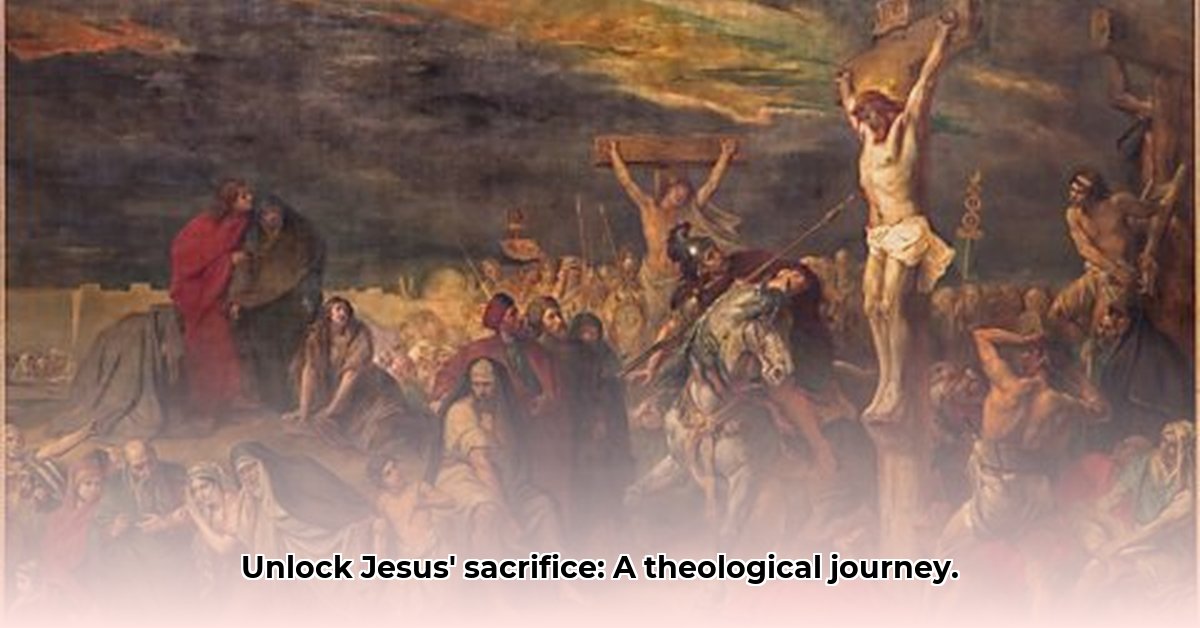
Jesus Christ's Sacrificial Death: A Multifaceted Perspective
The death of Jesus Christ stands as a pivotal event in Christian theology, profoundly shaping beliefs about salvation, God's nature, and humanity's relationship with the divine. However, understanding its significance requires navigating a complex landscape of interpretations and theological perspectives that have evolved over centuries. This overview explores these diverse viewpoints, examining biblical foundations, historical context, and the enduring relevance of this central Christian tenet. How do various theological perspectives illuminate the profound mystery of Jesus' sacrifice? For further exploration on the divine nature, see this article on God's death.
Understanding Atonement: Diverse Theological Interpretations
The concept of atonement—reconciling God and humanity—is central to understanding Jesus' death. Several prominent theories attempt to elucidate the mechanism by which this reconciliation occurred. One common perspective, substitutionary atonement, posits that Jesus died in place of humanity, bearing the penalty for our sins. This view often emphasizes the justice of God, satisfied by Christ's sacrifice (e.g., Penal Substitutionary Atonement, prevalent in Reformed theology). However, other perspectives emphasize different aspects of God's character and the nature of sin. Some highlight God's love and mercy, focusing on the transformative power of Christ's sacrifice to inspire repentance and reconciliation (Moral Influence theory). Others see Christ's death as a victory over the forces of evil, liberating humanity from their dominion (Christus Victor theory). Still others, such as the Governmental theory, view the sacrifice as upholding God's moral order, demonstrating His righteousness and deterring future sin. These diverse interpretations, far from being mutually exclusive, often complement and enrich each other, offering a multifaceted understanding of the atonement.
Biblical and Historical Context: Ancient Sacrifices and New Covenant
The Old Testament provides a crucial backdrop for understanding Jesus' sacrifice. The sacrificial system, with its animal offerings and rituals, foreshadowed the ultimate sacrifice of Christ. These practices, while imperfect, symbolized humanity's yearning for forgiveness and cleansing from sin. The blood of the sacrificial animals represented this cleansing—a concept deeply rooted in ancient Israelite religious practices.1 Many theologians see Jesus' death as the fulfillment of these Old Testament prophecies, the ultimate and complete sacrifice that surpasses all previous attempts. The New Testament, particularly the Gospels and the writings of Paul, further develops this theme, portraying Jesus as the "Lamb of God" who takes away the sins of the world (John 1:29).
1 Leviticus 17:11
Key Passages and Theological Debate: Interpreting Scripture
Texts such as Isaiah 53, which describes a suffering servant bearing the sins of others, and John 1:29, introducing Jesus as the "Lamb of God," are central to discussions about Jesus' death. However, the interpretation of these and other passages varies considerably. These differences often stem from varying beliefs about the nature of God, humanity, and the process of salvation. The nature of God's justice, mercy, and love; the extent of humanity's responsibility for sin; and the precise mechanism of salvation are all key areas of ongoing theological debate. These debates, while sometimes intense, ultimately enrich our understanding of the depth and complexity of Christ's sacrifice.
The Transformative Impact: Beyond History
Jesus' sacrificial death is not merely a historical event; it's a life-altering moment with profound and ongoing consequences. It represents a radical demonstration of God's love and commitment to humanity's redemption, fundamentally altering the relationship between God and creation. This act of sacrifice is interpreted by Christians as the basis for forgiveness, reconciliation, and the hope of eternal life. The ramifications extend beyond personal faith, influencing ethical frameworks, social justice initiatives, and conceptions of human dignity. The enduring power and transformative potential of Jesus' death continue to resonate throughout history and shape contemporary life.
Denominational Differences and Ongoing Exploration
Although the centrality of Jesus’ death is universally acknowledged within Christianity, interpretations of its significance differ across various denominations. Disagreements may arise regarding the extent of the atonement, the nature of God's justice, and the specific mechanisms of salvation. These differences, however, highlight the rich and ongoing exploration of this central Christian teaching. Far from undermining the profound importance of Jesus’ sacrifice, these varied perspectives encourage further reflection and stimulate dialogue within and between faith traditions. The study of Jesus' death remains a dynamic and evolving field of theological inquiry.
Questions for Continued Reflection
The theological exploration of Jesus’ sacrifice continues. Many questions remain central to the ongoing discussion: How does Jesus' death reveal God's character? To what extent are we accountable for our actions, and how does Jesus' sacrifice relate to this accountability? What is the precise scope of the atonement—does it encompass all humanity or only some? What does it truly mean to be "saved," and is salvation a singular event or an ongoing process? These and other critical questions demonstrate the multifaceted nature of this profoundly important event in Christian history and sustain its continuing relevance.